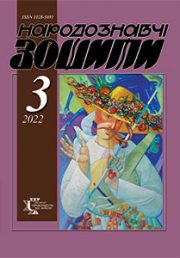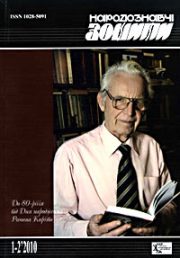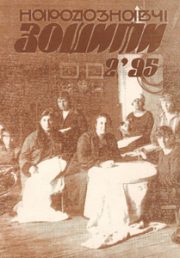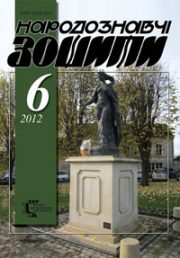The Ethnology Notebooks. 2023. № 1 (169), 77—83
UDK 930(477.83/.86)”1911”
DOI https://doi.org/10.15407/nz2023.01.077
SOVA Andriy
- ORCID ID: https://orcid.org/0000-0003-0548-4975
- Doctor of Historical Sciences, Associate Professor, Senior Researcher,
- Associate Professor of Olympic Education,
- Lviv State University of Physical Culture named after Ivan Bobersky,
- 11, Kosciuszko street, 79007, Lviv, Ukraine;
- Senior Researcher at the Department of Modern History,
- Institute of Ukrainian Studies I. Krypyakevych
- of the National Academy of Sciences of Ukraine,
- 4, Kozelnytska street, 79026, Lviv, Ukraine,
- Contacts: e-mail: sovaandrij1980@gmail.com
Abstract. For the first time in Ukrainian historiography, the study of «Zaporozhian ihryshcha (games)» — the national sports competitions of the Ukrainians of Galicia in 1911 were carried out. The aim of the study is to comprehensively analyze one of the key pages in the history of Ukrainian sports in Galicia on the eve of the First World War. The article pays attention to the prerequisites, the program, the results of the first national sports competitions of the Ukrainians and the sports terminology of that time. The territorial boundaries of the study include Lviv the place of the competition and Galicia; the chronological boundaries — October, 1911. The source base for analysis in the research were ukrainian-language publications published in 1911, in particular the Lviv journals «Dilo» (Business), «Visty z Zaporozha» (News from Zaporozha); the anniversary corpus of the sports society «Ukraine» published on the occasion of the organization’s 25th anniversary (Lviv, 1936); the epistolary legacy of the competition organizers — Ivan Bobersky (1873—1947) and Stepan Haiduchok (1890—1976), which is kept in the Central State Historical Archive of Ukraine in Lviv.
It was established that the prerequisites for holding «Zaporozhian ihryshcha (Games)» were the active activity of athletic and sports organizations in Lviv, in particular the gymnastic society «Sokil-Batko» (Falcon-Father), «Ukrainian Sports Club» at the Academic Gymnasium and its branch, the sports society of higher school students «Ukraine», «Zmagovy Soyuz» (Sports Union), as well as «Syanova Chayka» (Sya nova gull) from Peremyshl, «Sich» from Stryi, «Podillia» from Ternopil, etc. «Zaporozhian ihryshcha (Games)» showed the potential of Ukrainian sports of that time.
In publications and letters, Ivan Bobersky used special terminology to describe this kind of competition: he borrowed the word «Ihryshcha»(Games) from the annals of Kyivan Rus; the word «Zaporozhian» was added in honor of the famous Zaporozhian Cossacks and Zaporozhian Sich.
Keywords: Galicia, Lviv, Stryi, Ivan Bobersky, Stepan Haiduchok, Petro Franko, the First Zaporozhian Games, «Ukraine», «Ukrainian Sports Club», «Zmagovy Soyuz», «Sokil-Batko», «Sich», physical education, sport, competition.
Received 4.01.2023
REFERENCES
- Sova, A. (2017). Ivan Bobersky is a leading figure of the Ukrainian Sokil movement. Ukraine: cultural heritage, national consciousness, statehood. Ukrainian liberation movement of the 20th century (Issue 30, pp. 3—22) [in Ukrainian].
- Sova, A., & Tymchak, Y. (2014). Ivan Bobersky: the formation of the Ukrainian physical education tradition in the Academic Gymnasium in Lviv in the first quarter of the 20th century. New age (Vol. 2, pp. 16—26). Lviv: Ivan Krypyakevych Institute of Ukrainian Studies of the National Academy of Sciences of Ukraine [in Ukrainian].
- Sova, A., & Romaniuk, M. (2019). Ivan Boberskyi’s pedagogical activity at Bazilian Sisters Servants Gymnasium in Lviv (1906—1914). Skhidnoievropeiskyi Istorychnyi Visnyk (East European Historical Bulletin). Special issue, 4, 71—80.
- Sova, A. (2018). Ivan Bobersky is a popularizer of leshchetarstvo (skiing) among the Ukrainians. Cherkasy University Journal. Series: Historical sciences (Vol. 3—4, pp. 53—59). Cherkasy: Cherkasy National University named after B. Khmelnytsky [in Ukrainian].
- Sova, A. (2017). Ivan Bobersky is the founder and ideological inspirer of the Ukrainian Sports Club at the Academic Gymnasium in Lviv. Scientific and cultural and educational local history journal «Halychyna» (Part 29—30, pp. 166—175). Ivano-Frankivsk [in Ukrainian].
- Sova, A. (2019). Ivan Bobersky: socio-cultural, military-political and educational activities: monograph. Ivan Krypyakevych Institute of Ukrainian Studies of the National Academy of Sciences of Ukraine; Ivan Bobersky Lviv State University of Physical Culture; Center for Independent Historical Studies. Lviv [in Ukrainian].
- Butel, M. (1936). S.C. «Ukraine» — 1911—1936. SC Ukraine Lviv. 25th anniversary (Pp. 19—29). Lviv: Published by S. C. «Ukraine» [in Ukrainian].
- (1911). Leadership. Athletes compete at Zaporozhian competitions! Dilo, 219, 6 [in Ukrainian].
- (1911). The first Zaporizhian competitions in athletics. Dilo, 228, 5 [in Ukrainian].
- Haiduchok, S. (1911). From our sports. Zaporozhian competitions. Dilo, 236, 7 [in Ukrainian].
- Verkhola, O. (1936). Athletics. SC Ukraine Lviv. 25th anniversary. 1911—1936 (Pp. 79—86). Lviv: Published by S. C. «Ukraine» [in Ukrainian].
- (1911). Results of the First Zaporizhzhian competitions. Dilo, 230, 7 [in Ukrainian].
- Zeleny, A. «Ukraine». (1912, january 30). News from Zaporozha. Journal of physical education, sports, tourism and firemen’s societies, 65, 4 [in Ukrainian].
- (1911). Lunch on Sunday 15.X. Dilo, 225, 7 [in Ukrainian].
- Butel, M. (1936). Football (1911—1936). SC Ukraine Lviv. 25th anniversary. 1911—1936 (Pp. 49—63). Lviv: Published by S. C. «Ukraine» [in Ukrainian].
- (1912, january 30). The team «Ukraine» (15.X.1911) on «Sokil-Batko» stadium. News from Zaporozha. Journal of physical education, sports, tourism and firemen’s societies, 65, 4 [in Ukrainian].
- (1911). The match between «Ukraine-1» and «U.S.C.-1». Dilo, 230, 7 [in Ukrainian].
- Central State Historical Archive of Ukraine in Lviv. F. 366. Op. 1. Ref. 11 [in Ukrainian].
- Collection of honors. Private archive of Stepan Haiduchok. Lviv [in Ukrainian].







